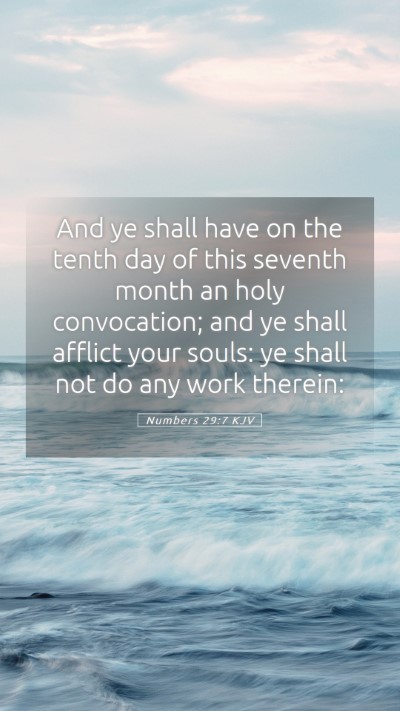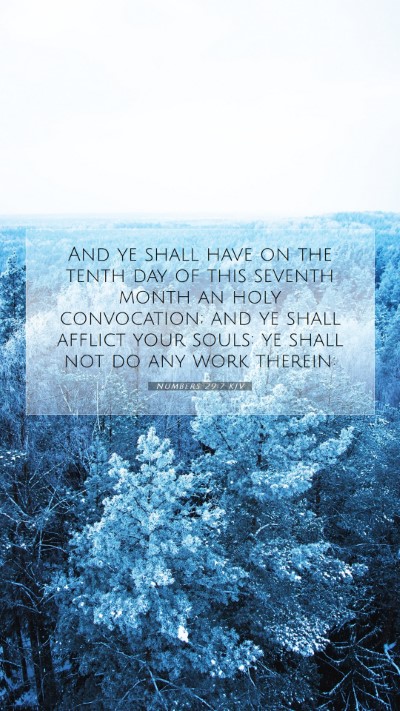Understanding Numbers 29:7
Numbers 29:7 states, "And ye shall have on the tenth day of this seventh month a holy convocation; and ye shall afflict your souls: ye shall not do any work therein." This verse is part of God's specific instructions to the Israelites regarding their festivals and sacred observances. Below, we provide a comprehensive analysis of this passage that combines insights from esteemed public domain commentaries, including those of Matthew Henry, Albert Barnes, and Adam Clarke, to assist anyone seeking bible verse meanings, bible verse interpretations, and bible verse understanding.
Detailed Commentary
Numbers 29:7 captures the essence of a significant religious event known as the Day of Atonement, which occurs in the seventh month of the Hebrew calendar. The verse emphasizes two main actions the Israelites must undertake:
- Holy Convocation: This denotes a sacred gathering of the people to worship God, emphasizing community and collective spiritual reflection.
- Afflicting Your Souls: This phrase indicates a period of fasting and self-examination, promoting humility and penitence before God.
Insights from Matthew Henry
Matthew Henry highlights the importance of this day as a time for repentance. He points out that the act of afflicting one’s soul is meant to remind the followers of their dependence on God’s mercy. This aligns with the theme found throughout the Scriptures regarding the value of humility and self-reflection.
Insights from Albert Barnes
Albert Barnes explains that the Day of Atonement serves as a foreshadowing of Christ’s ultimate sacrifice. He notes that the requirements given in Numbers 29:7 point to the necessity of atonement for sin, which is a recurrent theme in both the Old and New Testaments. This historical context enhances our bible study insights by demonstrating the continuity between Jewish law and Christian belief.
Insights from Adam Clarke
Adam Clarke emphasizes the solemnity of this occasion. His commentary brings attention to how the Israelites were to prepare for this holy day, marking it not just as a festival, but as a day of serious reflection and community worship. Clarke's analysis invites readers to consider the implications of such observances in the life of modern believers, encouraging a depth of understanding regarding the significance of penitence and unity in faith.
Application of Numbers 29:7
The modern application of Numbers 29:7 encourages believers to observe times of reflection and repentance in their own worship practices. Recognizing the importance of coming together as a community for spiritual growth and accountability can strengthen faith and promote a deeper understanding of Scripture.
Cross-References
- Leviticus 16:29-30 - Establishes the Day of Atonement and its significance.
- Psalm 51:17 - God desires a broken spirit and a contrite heart.
- Isaiah 58:6 - Discusses true fasting that God chooses.
- Joel 2:12-13 - Calls for a return to God with fasting and mourning.
Conclusion
In conclusion, Numbers 29:7 serves as an instructive passage rich with implications for both the ancient Israelite community and present-day believers. Through the combined insights of revered commentaries, we understand this verse as a call to communal worship, reflection, and dependence on God’s mercy. For those engaged in bible study groups or seeking effective bible study resources, Numbers 29:7 provides a profound opportunity for exploration and application in daily life.


